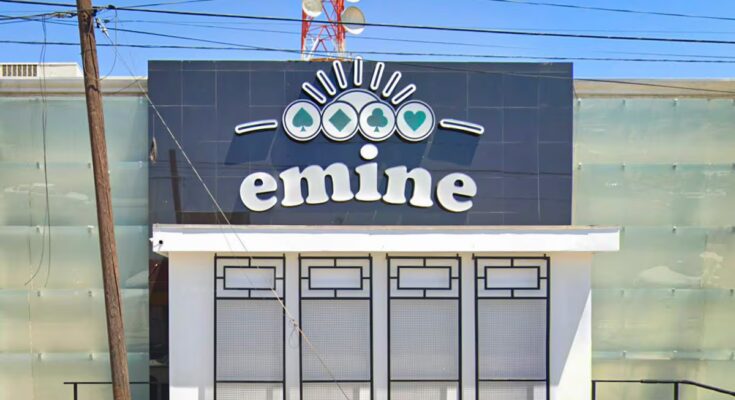From the lights of the betting machines and gourmet cuisine to the suspicion of money laundering for the Sinaloa cartel. Donald Trump’s government dealt a new blow this week to the heart of the finances of the criminal organization for which Joaquín’s heirs are competing El Chapo Guzmán and Ismael May Zambada. The US Treasury Department has blocked the Albanian Hysa family’s trading emporium and a dozen casinos on charges of money laundering for the gang. The recent Financial Crimes Bureau (FinCEN) report details a complex network that included front companies, transfers of millions of dollars overseas, and payments to the cartel through these betting houses.
What seemed like a business success story with bars, casinos, luxury restaurants, energy companies and clothing retailers turned out to be a nightmare. The Albanian Hysa family and 20 of its companies are now targeted by the United States amid Trump’s financial crusade against Mexican cartels. “The Hysa organized criminal group, composed of Luftar, Arben, Ramiz, Fatos and Fabjon, has used its influence, through investments and various activities in Mexico, to launder drug trafficking money. This criminal group is believed to be operating with the consent of the Sinaloa Cartel,” the Treasury said. Due to these suspicions, the Trump administration financially blocked six members of the Hysa family, his Mexican collaborator Gilberto López and around twenty of the group’s companies in Mexico, Canada and Poland.
According to the US investigation, Luftar Hysa, 57, is one of the pillars of the organization with constant travel between Mexico and Canada. Another key player in the smuggling of large sums of money, according to the Treasury, is Arben Hysa, owner and director of several corporate companies. Additionally, US authorities say Fatos and Fabjon were also involved in using a Europe-based entity to enrich themselves by laundering illicit funds belonging to drug traffickers. Following the investigation, the Treasury announced that it would freeze all assets of the targeted individuals and companies in the United States and would ban U.S. citizens from transacting with such entities.
It is not the first time that the shadow of drug trafficking has weighed on Hysa companies. Although the family operates away from the spotlight, in September 2022 Luftar Hysa published in several media outlets his defense against articles revealing his alleged links to the Sinaloa Cartel, particularly El Mayo Zambada. At the time, Luftar denied any connection to illicit activity. The businessman and engineer by profession assures that when he emigrated to Mexico in 2004, he was only trying to get out of the crisis his country was going through: “I, Luftar Ali Hysa, never convicted, never tried, never detained, declare that I have never had any problem with justice in my life. All my problems in life concern injustice,” he declared.
Three years ago, Luftar Hysa staunchly defended the legality of her activities and those of the rest of her family. The casino businessman described a life of struggle, displacement and discrimination. “The day I left Albania, my only goal was to escape the poverty of this country for me and my family and seek new development opportunities. I have always proudly defended my nationality. With equal pride I want to remember today that, in the companies that my brother and I have created, we employ more than 1,500 people in Mexico alone”, he declared at the time.
The entrepreneur Luftar Hysa also retraced his journey, after leaving his country, to South Africa and Peru until arriving in Mexico in 2004. “It’s not the first time they attack me, it’s the competition that attacks me. They are vile words. I don’t know Ismael El Mayo, I’ve never seen him. My only qualities are charisma and entrepreneurial skills”, the entrepreneur declared three years ago in front of the Albanian media.
From afar, the Hysa family is once again in the dock for alleged links to drug trafficking. The United States unhesitatingly points out that the Hysa clan devised a complex system combining casinos, restaurants and front companies to divert the complex from the Sinaloa Cartel. According to the Office of Foreign Assets Control (OFAC), this model has strengthened the gang led until a few years ago by El Chapo. The Treasury notes that, together with Luftar, Fatos, Arben and Fabjon collaborated with a US citizen to launder money, including the transfer of large sums of money from Mexico to the United States.
Among the companies controlled by Hysa financially sanctioned by the US are Bliri; Port Kitchen; Entertainment Los Mochis; The art of cooking and drinking; Entertainment Villahermosa; Entertainment and shows; Canhysamex international group; H Hydrocarbons Hysa Freight Forwarders; LH Pro-Gaming; His food processor; Rosetta Game; Hysa Holdings, among others. Its network of blocked companies expands throughout Nuevo León, Sinaloa, Sonora and Baja California.
El Mayo and the Mexican-Albanian bond
Suspicions about the presence and operation of drug trafficking in several states, as well as money laundering through casinos or real estate investments, are not recent. In 2023, journalist Jesusa Cervantes talks about it in her report BC and its casinos, the paradise of money laundering that the HS Food Processing company, one of those identified by OFAC, received authorization from the then mayor of the municipality of Rosarito, Hilda Araceli Brown, for the sale, storage and consumption of alcoholic beverages from the Ochuna restaurant. This establishment operates inside the Midas Casino, in the same city, and is one of the gambling houses accused by the United States of money laundering. Similarly, Brown, who now serves as the federal representative of Morena, the governing party, was sanctioned by OFAC last September for alleged links to the Sinaloa Cartel along with six other individuals and 22 companies. The lawmaker is accused of collecting extortion payments to this criminal organization in Baja California, as well as helping to cover up its operations during her term as mayor between 2021 and 2024.
However, a distinctive element of this conspiracy is the alleged presence of Albanian criminal groups in Mexico. According to Víctor Sánchez, a public security specialist and academic at the University of Coahuila, the links between the Albanian network and the Sinaloa cartel are created, according to several security sources, through Mayo.
Sánchez explains that Albanian mafias operate mainly in the largest ports in Europe, such as Rotterdam, Antwerp, Hamburg, Gioia Tauro, Valencia, Algeciras, among other important financial centers. According to him, a large part of the profits made from drug trafficking have begun to be laundered into real estate activities, such as the construction of apartments, buildings, offices and tourist complexes.
“For the Mexican organizations it was a great deal to be able to develop alliances with these clans, because not only were they among the main drug buyers in Europe, but they also helped them with the problem of money laundering in markets where it was much more difficult to trace it,” explains the security specialist.
The academic also states regarding the accusations against the Hysa family that, precisely because of the way in which Albanian organizations operate through family units, there are elements to think that these individuals residing in Mexico could be part of a larger criminal network, in which they are related to other clans of Albanian origin.
Sánchez explains that within this plot there are patterns that repeat themselves. The fact that organized crime invests in casinos is nothing new. “It happens all over the world,” he clarifies, because he gives them much larger figures than those actually shown. For example, the two million dollars discovered by OFAC and for which the Secretary of Security, Omar García Harfuch, is also responsible. “These operations are very difficult to control,” he adds.
What happened in Europe in the places where drug traffickers laundered money is also reflected in the Mexican territories where they planted their flag. “The territories where the Sinaloa cartel settled have had some boom tourist. These have developed in recent years in Baja California, Baja California Sur, in Sonora, where new hotels, new nightclubs, restaurants or spa“, concludes the specialist.
The “modus operandi” of casinos
FinCEN has targeted 10 Mexico-based gaming establishments for money laundering concerns. In a document that is part of the OFAC complaint, it details how the Midas, Emine, Mirage, Palermo and Skampa casinos, in states including Sonora, Sinaloa, Baja California and Tabasco, facilitated the laundering of more than two million dollars in illicit payments, between 2017 and 2024, for the Sinaloa Cartel.
The US sanctions fall a day after the Treasury in Mexico announced the freezing of the bank accounts of 13 casinos in the country. The investigations carried out revealed cash transactions, international flows and the use of unsupervised digital platforms.
FinCEN states that top executives at the Midas Casino in Mazatlán provided funds to this criminal organization on a monthly basis as part of an agreement with high command. He also points out that the Emine casinos, in San Luis Río Colorado; Palermo, in Nogales, both in Sonora; the Skampa Casino in Ensenada, Baja California; and Mirage of Culiacán, Sinaloa, are under the supervision of the same directors of Midas, who also made payments to the Sinaloa cartel as part of an agreement with other subsidiaries of the same company in Agua Prieta (Sonora); in Guamúchil, Los Mochis, Mazatlán (Sinaloa); as well as in Rosarito (Baja California); and with the Skampa Casino in Villahermosa (Tabasco).
The report believes that casino operators received detailed instructions from the Sinaloa Cartel on how to avoid detection by financial institutions’ anti-money laundering controls. The criminal organization has established that a maximum of two deposits must be made to designated bank accounts in amounts not exceeding 90,000 pesos or the equivalent of $4,354. The indication was to avoid handing over the money on consecutive days to avoid blocking the accounts. The other option recommended by the criminal organization was that a high command could personally collect the disbursements at the Midas Casino, in Mazatlán.
“As evidence of these concealment efforts, casino management received instructions on how to make payments to the Sinaloa Cartel, along with more than 30 bank accounts in the names of Mexico-based companies to make cash deposits,” the document states.



